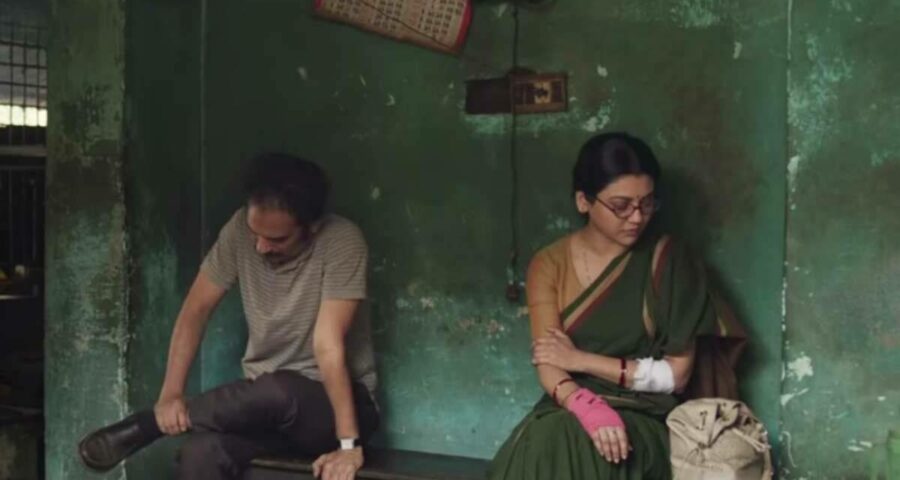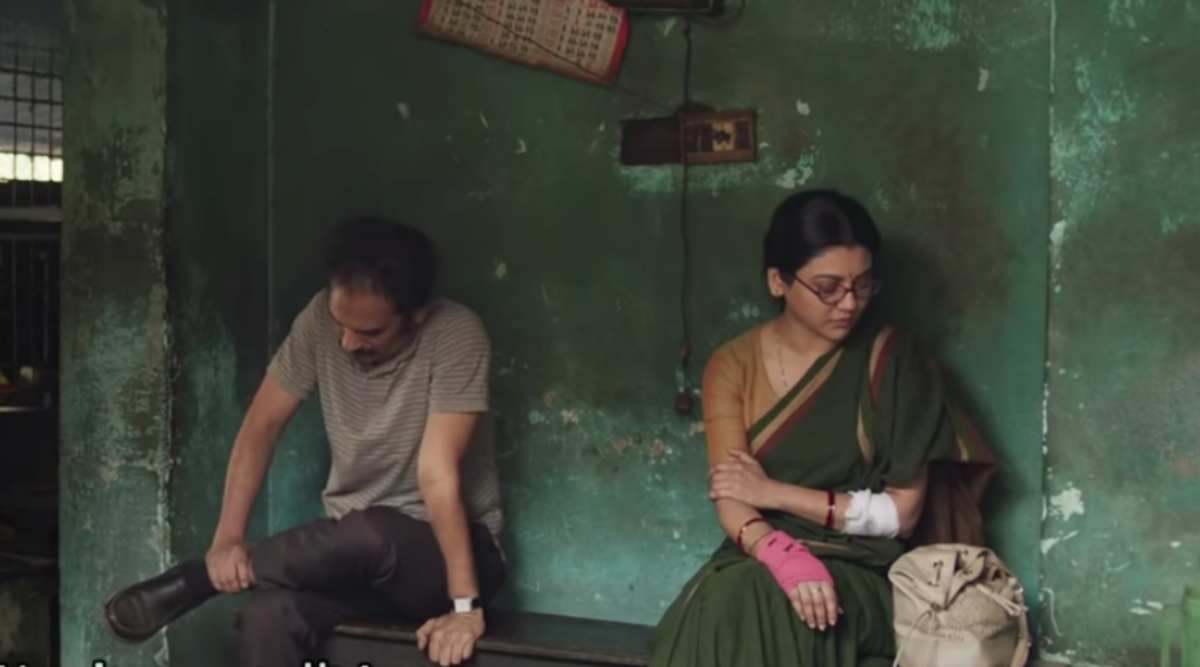At its heart, Atanu Ghosh's Binisutoy explores what makes us storytellers and what makes stories worth telling, if what is real needs to be the reality. It uncovers the lies we carry within ourselves on the pretext of living through them.
Atanu Ghosh’s Binisutoy — an affecting if ornate film — opens with the cacophony of hope. A local competition promises Rs 50 lakh as the winning amount and people are queueing up. Srabani Barua and Kajal Sarkar (Jaya Ahsan and Ritwick Chakraborty) are among the hopefuls. At one point they find themselves in a room, answering the crucial question: what will they do if they win? Strangers both, they are tied by the eagerness of a common dream. Circumstances ensure they spend most of the day together, interacting with the urgency of unfamiliarity. She informs him how she broke a vase that morning, he tells her about misplacing his fianceé’s money. When they part, they do so as confidantes.
A setting such as this makes for an ideal meeting ground of star-crossed lovers. Ghosh uses it for the chance encounter of two people wanting to be someone they are not. Srabani Barua and Kajal Sarkar do not really need the money. They are affluent individuals leading their own lives. She heads her family tea business and is separated from her husband. He is a civil engineer and is married with a child. But they are also saturated with an emotional numbness that stems from being lonely; they suffer from an entrapment rooted to their textbook existence. This play-acting then becomes their way of escaping as if life is one big reality show.
Most films portray how far a story can take its characters. Binisutoy outlines how far characters can go in search of a story. It is a whimsical premise but not entirely implausible. Isn’t the pursuit of story a more potent incentive to live; wouldn’t life become more bearable if it was a story? The possibilities are endless and Ghosh designs the narrative in a way that rewards careful watching. Take, for instance, how Srabani and Kajal keep spinning tales from objects they possess — the bundle of notes, a broken vase — like their curiosity to know the other is a masked desire to be the better storyteller, like the one they are trying to convince of this reality is themselves.
Most films would also use this revelation as a resolution. Ghosh opens with it, signalling his intent of understanding these characters rather than just presenting them; exploring ways in which pretension sometimes becomes the only route to express oneself more intensely. Binisutoy is most gratifying when it refuses to handhold viewers, letting them instead draw up a portrait of Srabani and Kajal from the alternate reality they craft for themselves. Suddenly every detail assumes the importance of a plot point, mundane items like a camera, a name and a broken vase carry the weight of desires. Stories become a reservoir of aspirations.
https://youtube.com/watch?v=lwU5g8wZd7g%3Fversion%3D3%26%23038%3Brel%3D1%26%23038%3Bshowsearch%3D0%26%23038%3Bshowinfo%3D1%26%23038%3Biv_load_policy%3D1%26%23038%3Bfs%3D1%26%23038%3Bhl%3Den-US%26%23038%3Bautohide%3D2%26%23038%3Bwmode%3Dtransparent
Ghosh achieves much by doing little, constantly egging us to look deeper. There is a fascinating bit when Srabani recounts making tiffin for her daughter, unperturbed by the sound of a train thundering outside. Later, she gets frightened on seeing a lizard. Being placed at the intersection of myth and reality, the moment becomes a site of probabilities– mirroring at once who she is deep down or who she wants to be–without confirming any. Kajal’s story gives a peek into his crushed dreams, the corporate barter he might have made for survival.
Conversely, Binisutoy suffers when Ghosh scampers to explain. The Kheya Chattopadhyay character serves no other purpose other than verbalising the theme of the film, contextualising in a way Srabani’s flight to escape. In another moment, Kajal is hit on by his friend’s wife. The scene encapsulates his drudgery and possible unhappiness in marriage but the exposition is redundant not just because Bengali films have made a mockery of horny married women but because it has Ritwick in the frame who can make evoke dejection by just breathing. There is a scene where his wife threatens to leave and he tells her not to come back. He does so, lying down without a speck of resentment on his face, just indifference like none of it really matters to him.
The question Binisutoy seeks to pursue is, when do some lies assume the authenticity of stories and if they sustain us, do we recognise them as deception? What then is real, and who decides that? It is a noble query but the implication is troubling. In Srabani and Kajal’s willingness to be other people they exhibit their solitude but their choice displays their gaze. By wanting to be people who would line up and partake in a flimsy competition, they manufacture struggle. The obvious reading is they do so to feel something. But that their discontentment is sketchily orchestrated as a last ditch effort for justification, derails the aspiration, making it look less like longing and more like fetishisation. Like the subplot of Srabani’s uncle (Kaushik Sen), an idealistic man ousted from his company does not hold up.
At its heart, Ghosh explores what makes us storytellers, uncovers the lies we carry on the pretext of living through them knowing fully well that is not our life. It foregrounds the lives we touch by living that way. But at some point the film loses sight of what is real and what is reality, even by its own definition. The contrived ending affirms the same.
Binisutoy is playing in theatres.
Source: Read Full Article


